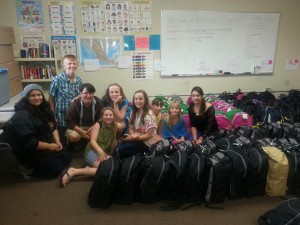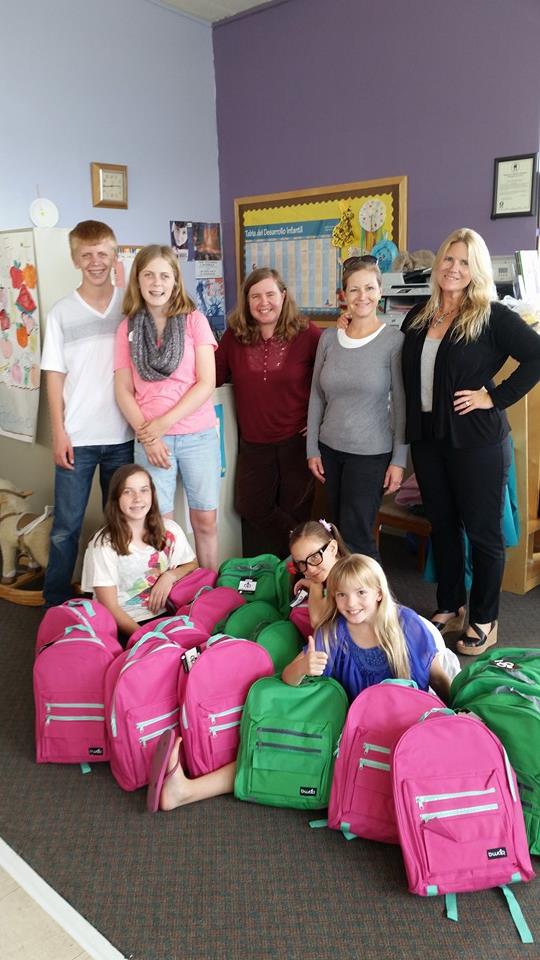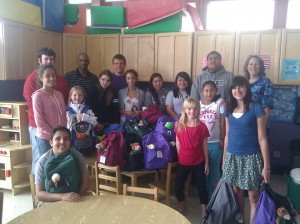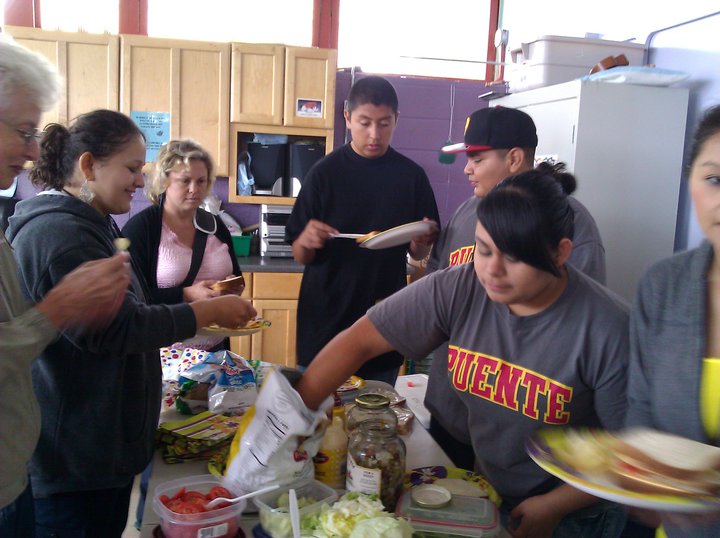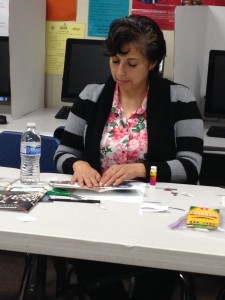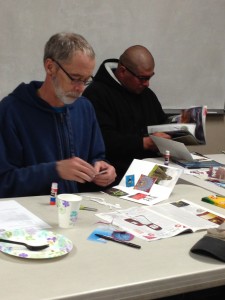Diana Lopez really enjoys her two childcare jobs within Puente’s Youth Leadership and Employment program. The 19-year-old likes working with small children. And this summer, her earnings are helping her family pay the rent. Both her parents recently lost their jobs at a Pescadero flower nursery. Now Puente’s entire youth program, is in jeopardy because it no longer qualifies for federal funding.
“My parents are trying to find a job and work hard, but they need my help,” says Lopez, who helps staff an all-day pre-kindergarten program run by the La Honda-Pescadero Unified School District and provides activities for children while their parents attend Zumba classes and parenting programs like Abriendo Puertas.
Lopez has been a part of Puente’s youth program since her sophomore year of high school. She readily admits the experience has changed her life. “I see myself as a more responsible person, more organized, more outgoing. Back then I was such a troublemaker,” she says jokingly.
Lopez struggled as a student. She rarely did her homework and failed nearly all her tests. “I would always say I wanted to drop out of high school. People at Puente would say, ‘You’ve got to go to college.’ Puente helped me with tutors. The fact that I went to college, I have Puente to thank for that,” she says,
Today, not only is she thriving in college, she is a leader at Puente.
Puente’s Youth Leadership and Employment Program has always been about more than giving young people a job. It’s about cultivating their futures, giving them marketable job skills, and offering them the chance to earn an hourly wage.
More often than not, these youth use their earnings to support their low-income families or to pay for college.
Now all their futures are affected by the news that Puente has lost $240,000 worth of federal funding for its youth program – which includes all youth salaries, funding for field trips, transportation, food and Puente’s program personnel, including a teacher for summer reading. The changes came down in June, just as the summer youth program was gearing up.
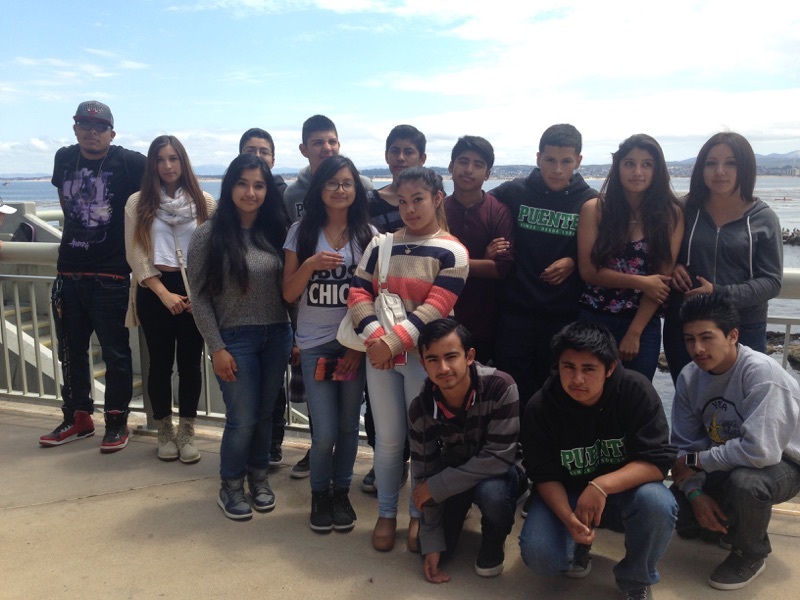
Some of the participants in Puente’s youth program at the Monterey Bay Aquarium on a recent field trip.
The federal Workforce Investment Act has been the program’s main source of funding, as administered by San Mateo County. But a recent reboot of the federal program limited the requirements for funding to such an extent that not one of the youth currently enrolled in Puente’s Summer Youth Program qualifies for assistance, says Puente Executive Director Kerry Lobel.
One major difference in the new program: the U.S. Department of Labor has switched its focus to out-of-school youth – students who dropped out of high school or did not continue on to college. That’s the one thing Puente’s youth program does: it helps keep kids in school and pushes them to attend college.
But just because the money is gone, doesn’t mean the program will disappear.
“Puente has a strong commitment to the youth of the South Coast – to youth leadership training and job preparation. We did it before we had county or federal funding, and we’ll do it after,” says Lobel.
Even if it means making other painful cuts – inconceivable as those would be.
“It’s a cornerstone Puente program and one we’re fully prepared to let other programs go to support – although God knows what that looks like,” she adds.
Since 2007, Puente has been the largest employer of young people on the South Coast. Each summer, Puente hires and trains dozens of youth – nearly 30% of students in Pescadero Middle and High School. Without Puente, South Coast youth lack access to employment and enrichment opportunities. But thanks to the Youth Leadership and Employment Program at Puente, between 30 and 40 young people earn salaries as childcare providers, program managers, tutors, camp counselors, and provide office support to promote job readiness and personal development.
Their collective labors not only support Puente’s programs but the La Honda-Pescadero Unified School District, YMCA Camp Jones Gulch, the library in Half Moon Bay, and a local farm program, among other examples. Click here for a video diary of the 2014 youth summer program.
The funding gap has forced Puente to tap into its rainy day reserve, but that’s not a sustainable solution. “We have 38 young people who are now working at Puente who we need to pay,” says Lobel. A Puente youth typically earns $2,500 to $5,000 a year, depending on whether they work over the summer or year-round.
Puente needs to buy time to find long-term institutional support for the youth program. And that’s where we need our supporters to step in.
Puente is launching a campaign to raise $168,416 by the end of the summer, and we are calling on the wider community to step up. A donation of $493 supports one Puente youth for one week and provides a salary,access to transportation, summer reading and tutoring, food and field trips. $4,432 pays one youth’s salary and support services for the summer. Please click here to donate.
But back to the students.
Diana Lopez still remembers her first job with Puente, working at the front desk as a receptionist, answering phones, greeting participants and helping them get connected up with staff.
By the time she was 15, Lopez had already seen the inside of the principal’s office and been suspended from school more times than she could count. Her new role at Puente involved working with adults; making conversation and helping people feel welcome. It was tough at first. “In my first year it was hard for me to speak to people,” says Lopez. “But once I started working at Puente, I had something to be into. I had to be responsible and organized with my work.”
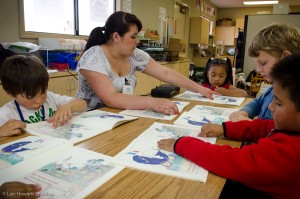
Diana assists children in the summer of 2012
That was in 2011. Since then, Lopez has held a series of jobs through Puente with increasing levels of responsibility: reading to students at Homework Club; after-school child care and one-on-on tutoring with the local school district; working as a teachers’ aide and translator in Puente’s ESL classes. Now she is a student at College of San Mateo. She used part of her Puente earnings to buy a used Honda Civic to drive to her classes. She has decided she wants to be a police officer.
Lopez’s life-changing experience would not have been possible under the new way of administering the Workforce Investment Act, now known as the Workforce Innovation and Opportunity Act. Under the new rules, only youth whose family earnings fall below the federal poverty level, who are disabled, or who are deficient in basic skills can qualify. Ironically, that doesn’t include any South Coast youth – even those whose parents are farm workers.
The new federal rules also discourage nonprofits from sponsoring students as young as 14 or 15, and prevents them from holding more than one job at a time. That’s just not practical for Puente youth, who would not otherwise have a chance to find work. And from Puente’s perspective, early intervention spells better chances of success.
Kris Gonzalez is 15 and is already in his second summer job with Puente. Last year he chose to help out with a children’s reading program at the Half Moon Bay Library. He helped teachers supervise the youngest children, watched them at playtime, took care of giving them lunch and bathroom breaks, and reshelved books.

Kris on the field trip to Monterey Bay Aquarium.
“It was really special to have that for my first job. The kids were really social, and they wanted to hang out with me and talk to me,” he says. “It was a lot more responsibility too, because I had to take care of children. That was a biggie.”
This year Gonzalez wanted to work in a kitchen, so he does food prep at YMCA Camp Jones Gulch in La Honda. “If I’m ever hungry I know how to cook something right away,” he notes.
If he didn’t have his summer job, Gonzalez would likely spend most of his time holed up in his bedroom reading, or at his friends’ houses playing video games. But because of Puente, he’s had the chance to work and to stretch himself beyond his comfort zone.
Gonzalez, like the other high school students in the youth program, is also working with Puente’s Summer Teacher, Shannon White. Last year White spent four weeks at Puente through a grant from the Lilly Endowment, coming to the South Coast during her summer break from her job as a high school teacher in Indianapolis. This year, she’s coordinating summer reading with students and helping them navigate their transcripts to prepare for the coming school year. White has also been one of the chaperones on the field trips for the summer. “I chose to return to Puente this summer because I have a heart for this organization and the people it serves–in particular these amazing students with incredible stories. They deserve every chance and opportunity we can give them. ”
Gonzalez imagines himself becoming a scientist or an engineer, “or maybe both.” In order to make his dreams come true, he knows he’ll need to go to college. But his parents told him they won’t be able afford the tuition on the basis of their income alone. They need their son to chip in, and thanks to Puente, he can.
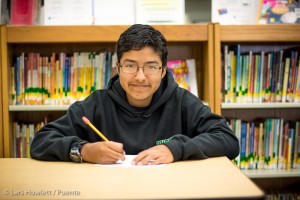 “When I go to college, we won’t have to pay as much,” he says.
“When I go to college, we won’t have to pay as much,” he says.
Diana Lopez, Kris Gonzalez, and other Puente youth need your help today. Please click here to donate to the Youth Leadership and Development Program. Thank you


